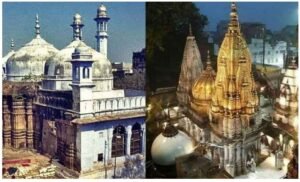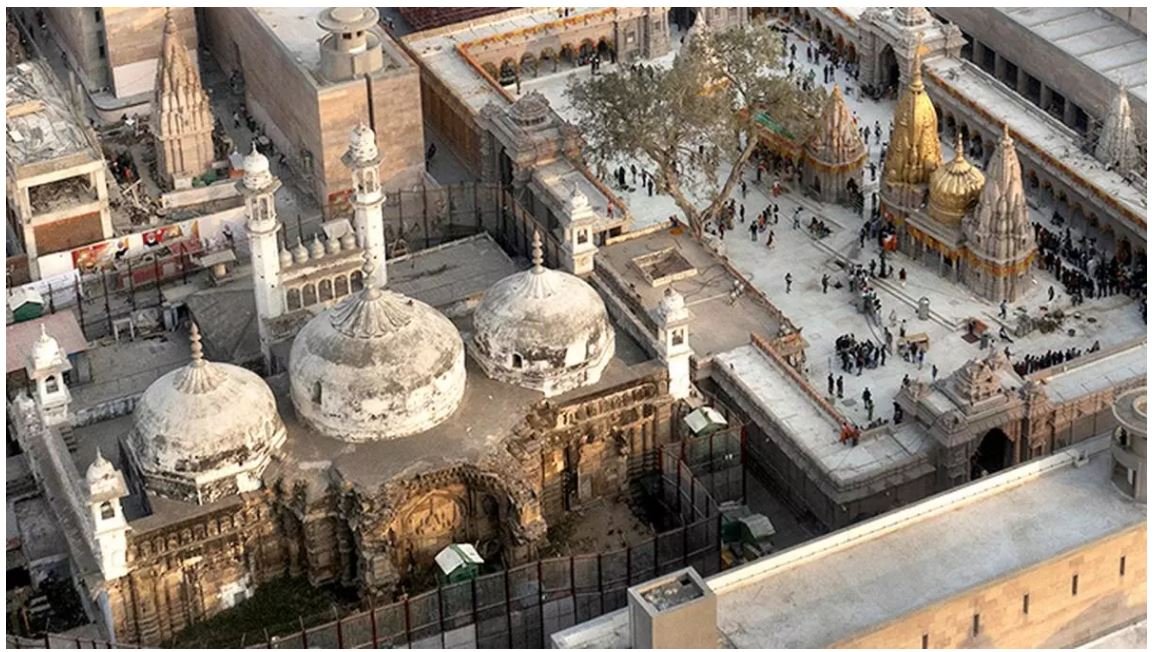Eleven individuals requested copies of the ASI report this week, marking a new development in the Gyanvapi mosque issue. Attorneys on the Hindu side maintain that once the poll makes the Shivling-fountain issue clear, they will be “on the verge of victory.” The Archaeological Survey of India was requested by the Varanasi court earlier this week to release the findings to the public and furnish printed copies to both parties.
According to the ASI, a sizable Hindu temple predated the building of the current building. “This represents the definitive conclusion of the ASI,” attorney Vishnu Shankar Jain remarked.
At the heart of the dispute is a structure discovered on the property during a court-mandated assessment of the building next to the Kashi Vishwanath temple. The Muslim side has called it a fountain, whereas the Hindu side calls it a “Shivling.” After learning of the alleged Shivling, the Supreme Court ordered the ‘Wazu‘ location to be blocked in 2022.
After a district court decision in July 2023, the Archaeological investigation of India conducted a scientific investigation of the Gyanvapi premises. The ASI had attempted to ascertain whether the mosque was built on top of an earlier Hindu temple construction.
The women Hindu petitioners sought direction from the supreme court in January of this year to clean the entire ‘wazukhana‘ area of the Gyanvapi mosque.
The ‘wazu‘ area is currently gated off. The space has been sanitized. The Varanasi District Magistrate is currently in charge of it. After the ASI survey data is received, I can confidently state that we will be close to winning. Jain told ANI earlier on Thursday, “I am confident that we will be able to witness the day when Gyanvapi will be free of this illegal encroachment.”

According to the attorneys for the Hindu claimants, eleven individuals—including those who identify as Muslims and Hindus—applied on Thursday for copies of the ASI assessment report on the Gyanvapi mosque complex, which is next to the Kashi Vishwanath temple.
Following an examination of the applications, the petitioners should receive the report either on Thursday or Monday, according to Hindu side attorney Madan Mohan Yadav.
In compliance with a July 21 district court decision, the Archaeological investigation of India (ASI) conducted a thorough investigation of the Gyanvapi grounds to ascertain whether the mosque was built over an existing Hindu temple structure.
The Hindu side in the Gyanvapi Mosque lawsuit, represented by Advocate Vishnu Shankar Jain, declared on Thursday that they will be close to winning once the Archaeological Survey of India (ASI) survey report is received.
The Varanasi district court on Wednesday ordered that the Archaeological Survey of India (ASI) report be made public today and provided in hard copy to both sides.
Attorney Hari Shankar Jain, representing the Hindu side, asserted following the court’s directive that “there is evidence to show that the mandir was demolished to make way for the construction of the mosque.”
Advocate Jain stated, “Many objections were raised to making the ASI report public,” in an interview with ANI on Wednesday. Nevertheless, the learned court decided in favor of providing the report to both parties after considering the arguments made by each. Everyone will have access to the report upon its release to the public.
The Supreme Court granted permission to a plea on January 16th, filed by female Hindu petitioners, requesting that the entire ‘wazukhana’ of the Gyanvapi mosque—the location of the purported ‘Shivling’—be cleaned and kept in a ‘hygienic’ condition.
In 2022, the Supreme Court issued an order sealing the “wazukhana” location after finding what was believed to be a “Shivling.”
The edifice, which the Muslims claimed to be a “fountain” and the Hindus a “Shivling,” was discovered on the mosque grounds on May 16, 2022, during a court-mandated inspection of the structure near to the Kashi Vishwanath temple.
The Gyanvapi mosque-Kashi Vishwanath temple dispute revolves around the ‘Wazu’ area, with both parties vying for ownership of the edifice found during the court-mandated study. (ANI)
Varanasi, Jan. 25 (PTI): According to the attorneys for the Hindu litigants, eleven individuals on Thursday requested copies of the ASI survey report on the Gyanvapi mosque complex, which is next to the Kashi Vishwanath temple. These individuals included both Hindu and Muslim applicants.
Following an examination of the applications, the petitioners should receive the report either on Thursday or Monday, according to Hindu side attorney Madan Mohan Yadav.
In compliance with a July 21 district court decision, the Archaeological investigation of India (ASI) conducted a thorough investigation of the Gyanvapi grounds to ascertain whether the mosque was built over an existing Hindu temple structure.
Yadav stated that attorneys for the five Hindu petitioners, the Anjuman Intezamia Masjid committee, the Kashi Vishwanath Trust, the state government, the chief secretary, the home secretary, and the district magistrate of Varanasi have all requested a copy of the report.
District Judge A K Vishvesh made the decision on Wednesday to grant both the Hindu and Muslim parties access to the ASI survey report about the Gyanvapi mosque complex.
Following his hearing, Judge Vishvesh ordered that copies of the survey report submitted to the court by the ASI be given to each party involved in the lawsuit so that they might object to it.
A copy of the ASI survey report was also made available to the state’s home secretary, Varanasi DM, and the Kashi Vishwanath temple trust by the court.
On a petition brought by Rakhi Singh and others, the court issued its ruling.
In response to the Hindu petitioners‘ argument that the mosque constructed in the 17th century covered an earlier temple, the court ordered the survey. On December 18, the ASI delivered its survey findings in a sealed cover to the district court.
According to Vishnu Shankar Jain, an attorney for the Hindu side, the ASI survey report on the Gyanvapi complex here indicates that the mosque was constructed on the foundation of an earlier temple.
Let us wait to hear the final verdict of the court on this matter.

